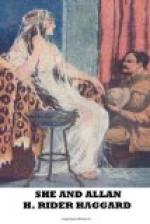“Yes,” I said, and shivered, for now I understood the awfulness of this poor man’s case. He was the father of a number of half-breeds who tied him to this spot as anchors tie a ship. I went on rather hastily past some sheds to a long, low building which proved to be a store. Here the quarter-blood called Thomaso, and some assistants were engaged in trading with natives from the Zambesi swamps, men of a kind that I had never seen, but in a way more civilised than many further south. What they were selling or buying, I did not stop to see, but I noticed that the store was full of goods of one sort or another, including a great deal of ivory, which, as I supposed, had come down the river from inland.
Then we walked on to the cultivated fields where we saw corn growing very well, also tobacco and other crops. Beyond this were cattle kraals and in the distance we perceived a great number of cattle and goats feeding on the slopes.
“This red-bearded Baas must be very rich in all things,” remarked the observant Hans when we had completed our investigations.
“Yes,” I answered, “rich and yet poor.”
“How can a man be both rich and yet poor, Baas?” asked Hans.
Just at that moment some of the half-breed children whom I have mentioned, ran past us more naked than dressed and whooping like little savages. Hans contemplated them gravely, then said,
“I think I understand now, Baas. A man may be rich in things he loves and yet does not want, which makes him poor in other ways.”
“Yes,” I answered, “as you are, Hans, when you take too much to drink.”
Just then we met the stately Miss Inez returning from the store, carrying some articles in a basket, soap, I think, and tea in a packet, amongst them. I told Hans to take the basket and bear it to the house for her. He went off with it and, walking slowly, we fell into conversation.
“Your father must do very well here,” I said, nodding at the store with the crowd of natives round it.
“Yes,” she answered, “he makes much money which he puts in a bank at the coast, for living costs us nothing and there is great profit in what he buys and sells, also in the crops he grows and in the cattle. But,” she added pathetically, “what is the use of money in a place like this?”
“You can get things with it,” I answered vaguely.
“That is what my father says, but what does he get? Strong stuff to drink; dresses for those women down there, and sometimes pearls, jewels and other things for me which I do not want. I have a box full of them set in ugly gold, or loose which I cannot use, and if I put them on, who is there to see them? That clever half-breed, Thomaso—for he is clever in his way, faithful too—or the women down there—no one else.”
“You do not seem to be happy, Miss Inez.”
“No. I cannot tell how unhappy others are, who have met none, but sometimes I think that I must be the most miserable woman in the world.”




